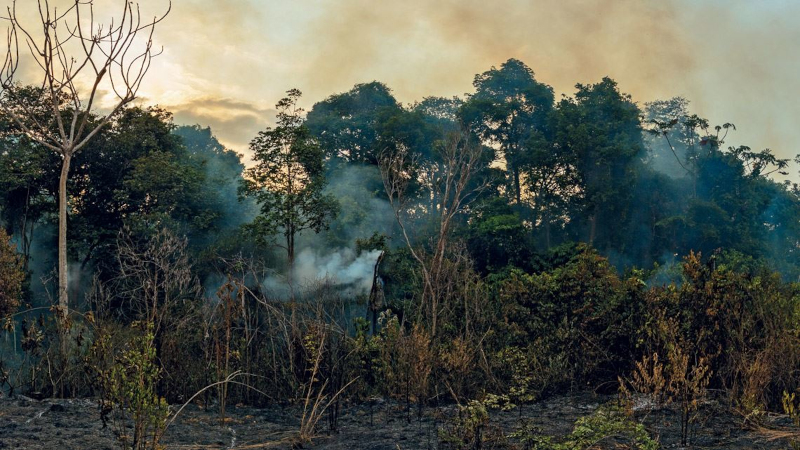

Artaxo mentioned that ecological restoration projects are important for revitalizing essential ecosystem services, such as maintaining rainfall patterns, but that the scale of these initiatives cannot compensate for the continued use of fossil fuels (photo: Aline Pontes Lopes/Pesquisa FAPESP)
At an event in the Blue Zone at COP30, the physicist and climatologist stated that the world is close to surpassing the 1.5 °C average warming limit and is heading towards 2.8 °C.
At an event in the Blue Zone at COP30, the physicist and climatologist stated that the world is close to surpassing the 1.5 °C average warming limit and is heading towards 2.8 °C.

Artaxo mentioned that ecological restoration projects are important for revitalizing essential ecosystem services, such as maintaining rainfall patterns, but that the scale of these initiatives cannot compensate for the continued use of fossil fuels (photo: Aline Pontes Lopes/Pesquisa FAPESP)
By Luciana Constantino, from Belém | Agência FAPESP – The world is close to exceeding the 1.5 °C limit for average global warming and heading toward the dangerous threshold of 2.8 °C. Due to its tropical and continental location, Brazil is expected to experience the most severe impacts: the country may face an increase of 4 °C to 4.5 °C compared to pre-industrial temperatures.
To halt this trajectory, the exploitation and use of fossil fuels must be eliminated in the short term through a just and feasible transition. For this reason, the 30th United Nations Climate Change Conference, held in Belém, is seen as a crucial opportunity for countries to define a clear roadmap for replacing oil, gas, and coal use. Physicist and climatologist Paulo Artaxo issued this warning during a presentation at the Finland stand in the Blue Zone at COP30 on November 14.
The 1.5 °C limit was established in the 2015 Paris Agreement and is considered a reasonably safe threshold by the scientific community to prevent more severe impacts of the climate crisis.
“To avoid this scenario, we need to adopt techniques such as carbon dioxide removal, that is, removing carbon dioxide [CO2] that’s already been emitted into the atmosphere in recent decades. There are a few potential ways to do this, one of which is large-scale ecological recovery, i.e., recovering forest areas by replanting what we’ve deforested,” said Artaxo, a professor at the University of São Paulo’s Physics Institute (IF-USP).
“The problem is that no existing technique today works effectively on the scale needed and at a price that can be paid. The high cost reaches thousands of dollars per ton of CO2 removed. This doesn’t mean that science won’t develop other innovative techniques in 20, 30, or 40 years. Therefore, the best solution is to attack the problem at its root, making a just and rapid energy transition and ending the exploitation of fossil fuels.”
Artaxo is one of nine international scientists who presented a statement highlighting the importance of data and science for decision-making and offering a similar warning. The document was also signed by Brazilian researchers Thelma Krug, a member of the FAPESP Board of Trustees; Carlos Nobre, a senior researcher at the Institute for Advanced Studies at the University of São Paulo (IEA-USP) and co-chair of the Scientific Panel for the Amazon; and Marina Hirota, from the Serrapilheira Institute.
The “Statement on the Current State of COP Negotiations” was released at the Planetary Sciences Pavilion, the first of its kind at United Nations climate conferences.
“Every 0.1 °C increase in global warming results in substantially greater impacts and risks, including longer and deadlier heat waves, more frequent and intense wildfires, extreme storms and precipitation, with disproportionate damage to vulnerable communities, fragile economies, and indigenous peoples. This means that adaptation must be a key focus at COP30,” the scientists write (read the full text here: planetarysciencepavilion.org/2025/11/14/statement-from-scientists-at-the-planetary-science-pavilion-about-the-current-state-of-cop-negotiations/).
The conclusion of a debate held among members of the Scientific Council of the COP30 presidency was also to pursue the goal of limiting the global average temperature increase to 1.5 °C, even if the outlook is to exceed it (read more at agencia.fapesp.br/56506).
Pathways
Artaxo said that although ecological restoration projects are important for revitalizing essential ecosystem services, such as maintaining rainfall patterns, the scale of these initiatives cannot compensate for continued fossil fuel use. “It won’t be possible to plant enough trees on the Earth’s surface to sequester CO₂ if we continue emitting as we do today,” he said.
The researcher also highlighted the proposal to produce a “roadmap” for decarbonizing all sectors of the economy. “What we do today determines what future generations will have to clean up in 20, 30, or 100 years,” Artaxo said. In international negotiations, the term “roadmap” refers to action plans that establish concrete steps, deadlines, and goals toward a common objective. These plans define who will do what, by when, and with what resources.
Brazil has been mobilizing behind the scenes to formalize a roadmap for abandoning fossil fuels on the COP30 agenda. The conference enters the final stage of negotiations this week and is scheduled to end on Friday, November 21. The proposal has already been endorsed by several European and developing countries.
Republish
The Agency FAPESP licenses news via Creative Commons (CC-BY-NC-ND) so that they can be republished free of charge and in a simple way by other digital or printed vehicles. Agência FAPESP must be credited as the source of the content being republished and the name of the reporter (if any) must be attributed. Using the HMTL button below allows compliance with these rules, detailed in Digital Republishing Policy FAPESP.






